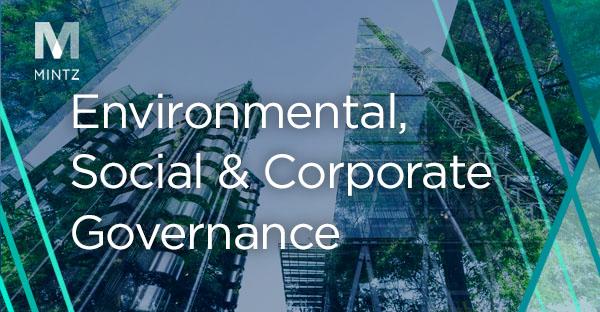
Employment
Viewpoints
Filter by:
New Year, New Laws: California Employment Law Updates for 2024
November 28, 2023 | Blog | By Kevin Kim, Jennifer Rubin
Key Changes & Updates to Employment Agreements: What Maryland and Virginia Employers Need to Know
October 30, 2023 | Blog | By David Barmak, Danielle Bereznay
Pay Transparency Law on the Horizon for Massachusetts Employers
October 30, 2023 | Blog | By Brendan Lowd, Kathryn Droumbakis, Danielle Dillon
Nasdaq’s “Show and Tell” Diversity Disclosure Survives Initial Challenge
October 23, 2023 | Blog | By Jennifer Rubin, Evan Piercey, Danielle Dillon
New York Widens its Employee Intellectual Property Protections
October 19, 2023 | Blog | By Geri Haight, Evan Piercey, Talia Weseley
Massachusetts Paid Family and Medical Leave Updates – What Employers Need to Know
October 19, 2023 | Blog | By Natalie C. Groot, Emma Follansbee, Kathryn Droumbakis
What Employers Need to Know About the EEOC’s Proposed Guidance On Workplace Harassment
October 16, 2023 | Blog | By Delaney Busch, Michael Arnold
The Equal Employment Opportunity Commission ("EEOC") released its Proposed Enforcement Guidance on Harassment in the Workplace. In light of recent legal developments, such as the Bostock v. Clayton County decision, which held that Title IX protects transgender persons from discrimination on the basis of sex, the #MeToo movement, the increase in remote work, changes to abortion rights, and changes in the way harassment may occur (e.g., online bullying or harassment), the proposed guidance illustrates the EEOC’s current interpretation of “existing requirements of the law” and/or its policies. Here are some notable parts of the guidance:
New York City Issues Amended Safe and Sick Time Regulations
October 12, 2023 | Blog | By Corbin Carter, Michael Arnold, Talia Weseley
In 2020, New York City amended its paid sick leave law, named the Earned Safe and Sick Time Act (“ESSTA”), to better align with New York State’s Paid Sick Leave law. Following these amendments, the Department of Consumer and Worker Protection (DCWP) published updated notices and FAQ documents, but stopped short of publishing formal updates to the corresponding ESSTA Rules – until now.
Minimum Wage Increases Now Effective in Multiple Canadian Provinces
October 10, 2023 | Blog | By Mitch Frazer, Brad Tartick, Patrick Denroche
Multiple provinces in Canada increased their general minimum wages effective October 1, 2023. The provinces that made such increases and their new minimum wages are as follows
Second Circuit Clarifies Standard for Evaluating Title VII Retaliation Claims
September 19, 2023 | Blog | By Kevin Kim, Michael Arnold
On the heels of the Fifth Circuit Court of Appeals’ recent decision clarifying its view of properly pled Title VII disparate treatment discrimination claims, which we previously covered here, the Second Circuit Court of Appeals in Carr v. New York City Transit Authority, has now clarified its view of the standard for pleading retaliation claims under Title VII.
Do as I Say And as I Do – California Amends Its Non-Compete Law
September 18, 2023 | Blog | By Nicole Rivers, Jennifer Rubin
On the heels of the New York and FTC non-competition legislation (discussed here and here), Governor Newsom recently signed an amendment to California’s non-compete ban into law. The amendment, S.B. 699, takes effect on January 1, 2024.
Expanding Existing Bereavement Leave Policies to Account for Fertility Related Losses
September 11, 2023 | Blog | By Natalie C. Groot, Danielle Dillon
Changes May be Coming to White-Collar Exemption Salary Thresholds
September 11, 2023 | Blog | By Michael Arnold, Kathryn Droumbakis
Fifth Circuit Court of Appeals Adopts Updated Standard for Pleading Title VII Claims
August 28, 2023 | Blog | By Kevin Kim
Caveat Employer: A Word of Caution When Drafting Non-Disparagement Provisions
August 10, 2023 | Blog | By Michael Arnold, Kevin Kim
A Template for Mandatory Employment Statements in Canada
August 3, 2023 | Blog | By Mitch Frazer, Brad Tartick, Patrick Denroche
California’s Highest Court Revisits Statutory PAGA Standing: What the Ruling Means for California Employers
July 25, 2023 | Blog | By Jennifer Rubin, Paul Huston, Nicole Rivers, Mike Flesuras
Employers Need to Go Further to Accommodate an Employee’s Religion
July 24, 2023 | Blog | By Michael Arnold, Kevin Kim
The MCAD’s New Guidance on the Massachusetts Parental Leave Act Aims to Provide Clarity On Its Continued Role in Providing Important Leave Entitlements to Massachusetts Employees
July 20, 2023 | Blog | By Natalie C. Groot, Kathryn Droumbakis, Danielle Dillon
Federally-Regulated Employers in Canada Required to Provide Free Menstrual Products for Employees
July 20, 2023 | Blog | By Mitch Frazer, Brad Tartick, Patrick Denroche
Explore Other Viewpoints:
- Data Centers & Digital Infrastructure
- AI: The Washington Report
- Antitrust and Federal Regulation
- Appellate
- Arbitration, Mediation & Alternate Dispute Resolution
- Artificial Intelligence
- Awards
- Bankruptcy & Restructuring
- California Land Use
- Cannabis
- Class Action
- Complex Commercial Litigation
- Construction
- Consumer Product Safety
- Corporate Governance (ESG)
- Cross-Border Asset Recovery
- DEI Legal Developments
- Debt Financing
- Direct Investing (M&A)
- Diversity
- EB-5 Financing
- Education & Nonprofits
- Employment
- EnforceMintz
- Environmental (ESG)
- Environmental Enforcement Defense
- Environmental Law
- Environmental, Social, and Corporate Governance (ESG)
- FDA Regulatory
- FDA in Flux
- False Claims Act
- Federal Circuit Appeals
- Financial Institution Litigation
- Government Law
- Growth Equity
- Health Care
- Health Care Compliance, Fraud and Abuse, & Regulatory Counseling
- Health Care Enforcement & Investigations
- Health Care Transactions
- Health Information Privacy & Security
- IP Due Diligence
- IPRs & Other Post Grant Proceedings
- Immigration
- Impacts of a New US Administration
- Insolvency & Creditor Rights Litigation
- Institutional Investor Class Action Recovery
- Insurance & Financial Services
- Insurance Consulting & Risk Management
- Insurance and Reinsurance Problem-Solving & Dispute Resolution
- Intellectual Property
- Investment Funds
- Israel
- Licensing & Technology Transactions
- Life Sciences
- Litigation & Investigations
- M&A Litigation
- ML Strategies
- Managed Care
- Medicare, Medicaid and Commercial Coverage & Reimbursement
- Mergers & Acquisitions
- Patent Litigation
- Patent Prosecution & Strategic Counseling
- Pharmacy Benefits and PBM Contracting
- Portfolio Companies
- Privacy & Cybersecurity
- Private Client
- Private Equity
- Pro Bono
- Probate & Fiduciary Litigation
- Products Liability & Complex Tort
- Projects & Infrastructure
- Public Finance
- Real Estate Litigation
- Real Estate Transactions
- Real Estate, Construction & Infrastructure
- Retail & Consumer Products
- Securities & Capital Markets
- Securities Litigation
- Social (ESG)
- Special Purpose Acquisition Company (SPACs)
- Sports & Entertainment
- State Attorneys General
- Strategic IP Monetization & Licensing
- Sustainable Energy & Infrastructure
- Tax
- Technology
- Technology, Communications & Media
- Technology, Communications & Media Litigation
- Trade Secrets
- Trademark & Copyright
- Trademark Litigation
- Unified Patent Court (UPC)
- Value-Based Care
- Venture Capital & Emerging Companies
- White Collar Defense & Government Investigations
- Women's Health and Technology

















